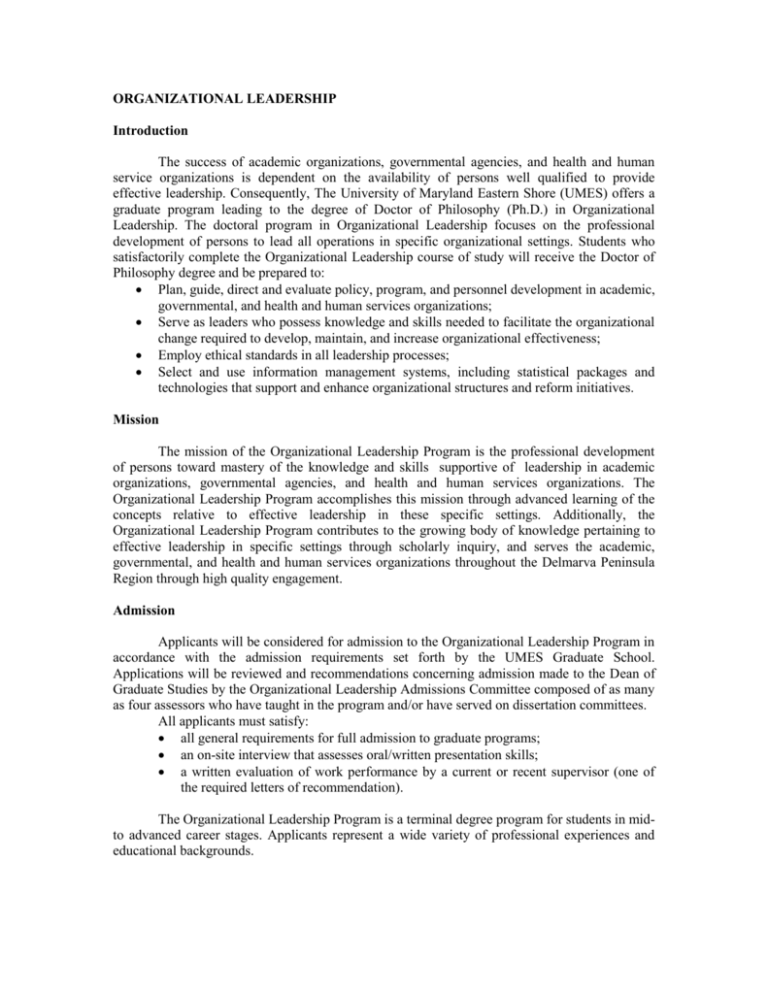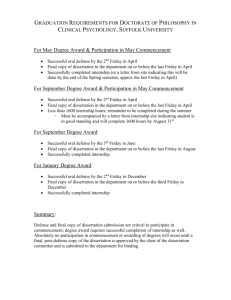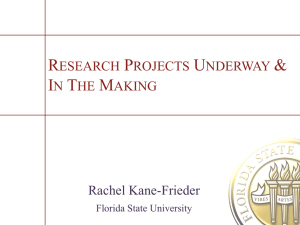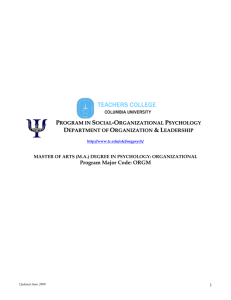organizational leadership - University of Maryland Eastern Shore
advertisement

ORGANIZATIONAL LEADERSHIP Introduction The success of academic organizations, governmental agencies, and health and human service organizations is dependent on the availability of persons well qualified to provide effective leadership. Consequently, The University of Maryland Eastern Shore (UMES) offers a graduate program leading to the degree of Doctor of Philosophy (Ph.D.) in Organizational Leadership. The doctoral program in Organizational Leadership focuses on the professional development of persons to lead all operations in specific organizational settings. Students who satisfactorily complete the Organizational Leadership course of study will receive the Doctor of Philosophy degree and be prepared to: Plan, guide, direct and evaluate policy, program, and personnel development in academic, governmental, and health and human services organizations; Serve as leaders who possess knowledge and skills needed to facilitate the organizational change required to develop, maintain, and increase organizational effectiveness; Employ ethical standards in all leadership processes; Select and use information management systems, including statistical packages and technologies that support and enhance organizational structures and reform initiatives. Mission The mission of the Organizational Leadership Program is the professional development of persons toward mastery of the knowledge and skills supportive of leadership in academic organizations, governmental agencies, and health and human services organizations. The Organizational Leadership Program accomplishes this mission through advanced learning of the concepts relative to effective leadership in these specific settings. Additionally, the Organizational Leadership Program contributes to the growing body of knowledge pertaining to effective leadership in specific settings through scholarly inquiry, and serves the academic, governmental, and health and human services organizations throughout the Delmarva Peninsula Region through high quality engagement. Admission Applicants will be considered for admission to the Organizational Leadership Program in accordance with the admission requirements set forth by the UMES Graduate School. Applications will be reviewed and recommendations concerning admission made to the Dean of Graduate Studies by the Organizational Leadership Admissions Committee composed of as many as four assessors who have taught in the program and/or have served on dissertation committees. All applicants must satisfy: all general requirements for full admission to graduate programs; an on-site interview that assesses oral/written presentation skills; a written evaluation of work performance by a current or recent supervisor (one of the required letters of recommendation). The Organizational Leadership Program is a terminal degree program for students in midto advanced career stages. Applicants represent a wide variety of professional experiences and educational backgrounds. Students who enter the program must have earned baccalaureate and master’s degrees from U.S. regionally accredited educational institutions or the degree equivalent in another country and demonstrate successful employment in an organization. Applicants, particularly those demonstrating nontraditional career paths, must clearly articulate on the Statement of Purpose application form the purposes for pursuit of the degree consistent with previous educational background and professional experiences and well-considered career plans. Application Deadline As a cohort-based program, there is one admission period per year (Fall). The application deadline for the Fall semester is March 1. Students are responsible to ensure that completed applications and supporting materials, including letters of recommendation and official transcripts, are received in the UMES Graduate School by the application deadline. Proficiency in Research and Statistics Applicants must be proficient in statistics and research methodology at the Master’s Level before entering the program. All applicants will take an assessment test on statistics and research methodology administered by the ORLD Program faculty. Based on the results of this test, applicants may need to take graduate coursework in statistics and/or research methodology and receive a grade of “B” or better prior to being admitted to the program. Program, Retention, and Exit Requirements All students in the Organizational Leadership program must complete 42 semester hours. Included in the Ph.D. course of study for Organizational Leadership students will be a supervised internship (6 semester hours) in an organization that aligns with the student’s interest. Provided that the candidate submits the Application for Candidacy form to the UMES Graduate School, the candidate advances to candidacy after successfully completing all course work; completing the internship, including the scholarly product; passes the comprehensive examination; completes the initial dissertation committee meeting; and, successfully completes the Dissertation Proposal Defense. Twelve (12) semester hours of credit are awarded for the satisfactory completion of the dissertation. The comprehensive examination is a minimum one credit. The sixty (60) credit hours in addition to the comprehensive examination required for the degree, can be earned within a three-year cohort sequence. Any applicable transfer credit for course requirements, up to 12 semester hours, must comply with the transfer of credit provisions of the UMES Graduate School and be approved by the Organizational Leadership Program Director and the Graduate Dean during the first semester of matriculation. Students enter the Organizational Leadership Program as members of a doctoral cohort. Because this program is designed to meet the needs of students who are employed full time, courses will be offered in a nontraditional scheduling format on Friday evening, Saturdays and Sundays. Classes are five weeks in duration, and generally meet twice. The remaining three (3) weeks are devoted to individual projects and research. Students must pursue coursework with the cohort. Students who become out of sequence with the cohort may join the next cohort as space permits. The cohort will complete twenty-seven (27) semester hours of the courses during the first year of enrollment in the program: three (3) courses in each of the fall, spring, and summer semesters (9 credit hours per semester). In the second year, the remaining courses will be completed. The dissertation is to be completed within four (4) years after successfully defending the proposal and being admitted to candidacy. The program’s grading and retention policies are listed in a subsequent subsection of this ORLD program text. The program specifics for the Doctor of Philosophy degree in Organizational Leadership are as follows: 1. Academic Learning: Course Requirements (42 semester hours) Organizational Leadership as a Field of Inquiry History and Philosophy of Organizations Theories and Processes of Organizations Politics, Organizations, and Leaders: Legal and Ethical Issues National and International Organizational Research and Development Research and Statistics Qualitative Research Quantitative Research Statistical Applications and Interpretations Statistics and Information Management Multivariate Statistics Advanced Theory and Research Methods Research Applications Professional Services Personnel Development, Management, Evaluation Public Relations and Marketing in the Non-Profit Sector Organizational Policy Analysis and Change 2. Engagement: Doctoral Internship (6 semester hours) 3. Inquiry: Dissertation Research (12 semester hours) Advisor and Research Advisory Committee Upon admission to the Organizational Leadership (ORLD) Program, students will be assigned to an academic advisor. This person will be responsible for advising on all aspects of the student’s progress through the program. Students should also consult for information, forms, and specific policies and procedures the ORLD program manuals on the Research Advisory Committee Process and the Processes Leading to Graduation. After passing the comprehensive examination (see the section below), the student will select a Research Advisory Committee (RAC), which must be approved by the ORLD Director and the Dean of Graduate Studies. The committee will include at least five (5) members selected from the following categories who must have UMES Graduate Faculty Status to be a voting member: RAC Chair: Select from ORLD adjunct and full-time faculty, as well as UMES full-time faculty. Previous doctoral committee chair experience is preferred. RAC Faculty: Select from ORLD adjunct and full-time faculty, UMES faculty, or faculty affiliated with another accredited university who have expertise in the student’s area of interest. RAC Research Faculty: Select from ORLD adjunct and full-time faculty, UMES faculty, or faculty affiliated with another accredited university who have expertise in research design and/or statistics. RAC Associate (optional): While possibly not having a terminal doctoral degree, this person is selected because of expertise in a desired area (may be related to the internship). This person may be a reader in a non-voting status if he/she does not have the terminal degree. Dean’s Representative: Assigned by the Dean of Graduate Studies. Comprehensive Examination The ORLD doctoral program holds written comprehensive examinations twice a year, in June and January. To be eligible to sit for the comprehensive examination, the student must be in “good academic standing,” that is, the student must have obtained an A or B in all courses and have successfully completed the internship and be registered for ORLD 700 (1 to 6 credit hours as needed). The comprehensive examination format is as follows: Examination questions reflecting coursework in core, research, and statistics, will be submitted from the ORLD faculty. The examination will be monitored by a proctor who cannot be a grader. Each student will be assigned a number so that “graders” (ORLD faculty) will not know whose examination they are grading. In other words, the comprehensive examination uses a double-blind technique. At least three graders will assess each question; their scores will be averaged. Averages will not be rounded to the next whole number. The student may hand-write the examination (exam booklet/paper will be provided) or submit answers via a UMES university provided computer (with only word processing capability). Students are allowed to bring only a pencil/pen to the exam room. The student must inform the ORLD Administrative Assistant two weeks before the examination date whether s/he will use pencil/pen or computer. After this time, the student is not allowed to waver from this test-taking decision unless, on the day of the examination, there are technical difficulties regarding the use of computers. Room assignment for the exam will be emailed to the student from the ORLD Administrative Assistant two (2) weeks before the examination date. Exams are scheduled to be taken in an 8 hour time block (3 hours in the morning [9:00 am— 12:00 noon]; a one-hour lunch break [12:00 noon to 1:00 pm]; and 4 hours in the afternoon [1:00 pm—5:00 pm]). Testing will begin at the specified times (9:00 am and 1:00 pm). If the student arrives at a later time, s/he will not be provided extra time to complete the examination. The exam proctor will distribute two questions at 9:00 in the morning (one will be a theoretical application question and the other will be a research question); after lunch, the proctor will distribute one statistics question at 1:00 in the afternoon. At the end of the morning session, the two questions and answers will be submitted to the proctor; at the end of the afternoon session, the statistics question and answer will be submitted to the proctor. The student cannot revisit submitted responses. Where students may be provided a choice among the questions to answer, e.g., one of two questions, students who respond to both questions will have only the first of the two responses graded. A student may not respond to both questions to attempt to improve the total score for the question. Points for each question are as follows: o The theoretical application question is worth 40 points; o The research question is worth 30 points; o The statistics question is worth 30 points total. The student must pass EACH question by at least 80 percent. Comprehensive exam questions are designed to assess the student’s knowledge about theoretical concepts as well as the ability to integrate this knowledge in a manner that “graders” perceive as indicative of doctoral ability. There is no required length for a comprehensive examination answer; passing has to do with quality—not quantity. Students will be informed in writing of their comprehensive examination score as well as a summary of graders’ comments. Usually, this process takes about 2-3 weeks. If a student does not pass the comprehensive examination, s/he must again register for one (1), and up to six (6), credit hours(s) in ORLD 700 until the next sitting date for the comprehensive examination. Only after passing the comprehensive examination will a student be eligible to register for dissertation credit hours (ORLD 899) and initiate the Dissertation Initial Meeting (IM) process. In the event of failing ANY or ALL of the five questions, the student may retake the failed section(s) ONLY once. If the student fails the re-taken part the second time (or fails to take the failed examination section(s) within one year), his/her admission status is terminated. The second examination attempt will be given no earlier than four months after the first examination and no later than one calendar year from the date of the initial examination. Doctoral Internship Students are expected to document at least 90 contact hours in the internship experience that is approved by three (3) ORLD faculty members and the ORLD Program Director. This field-based, supervised experience must culminate in a scholarly product, e.g., an article submitted to a peer reviewed journal, a presentation at a professional conference. The internship must be completed and evaluated before the comprehensive examination can be attempted. The Initial Meeting The Initial Meeting (IM), a meeting closed to everyone other than the ORLD student and his/her Research Advisory Committee (RAC), takes place when the student has passed the comprehensive examination and has the written approval from the Dean of Graduate Studies regarding membership of the student’s RAC. The purpose of this meeting is to review and summarize the student’s progress toward completion of the ORLD program degree requirements. All members of the RAC must attend the IM either in person or through audio/video (A/V) technology in the case of an RAC member at a distant location. The use of A/V technology must be prior approved by the Dean of Graduate Studies. Three (3) members must be physically present at the IM. In case of an emergency, the Dean of Graduate Studies may substitute the excused RAC member with an alternate to the RAC so that the IM may take place. The RAC chair is responsible for taking minutes of the meeting, copies of which will be forwarded to each RAC member, the student, the ORLD program director, the Dean of Graduate Studies, and a copy will be placed in the student’s file. After the RAC Chair opens the IM, the student should be able to discuss and present evidence pertaining to the following agenda items (RAC members may ask questions at any time): 1. Curriculum vitae 2. The student’s U.M.E.S. transcript, the internship’s scholarly product, and the comprehensive examination scores 3. Summary of proposed research (background, purpose of the study, proposed methods) 4. Discussion of proposal manuscript sections and the proposal defense, including appropriate forms 5. Tentative proposal manuscript/defense dates The RAC Chair will make closing remarks and dismiss the meeting. The Proposal Defense The student and his/her Research Advisory Committee (RAC) will agree upon a dissertation subject and accompanying research design. The Proposal manuscript will include the first three chapters (Introduction, Review of the Literature, and Methods) of the final dissertation (usually five chapters: Introduction, Review of the Literature, Methods, Results, and Conclusions/Discussion). A qualitative proposal and dissertation may contain more than three or five chapters respectively. The student will follow the APA Style Manual (5th or latest edition) regarding referencing. The student must have completed the Initial Meeting to defend his/her proposal. The Proposal Defense, administered by the RAC, is an oral examination of the research proposal. All members of the RAC must attend the Proposal Defense either in person or via prior approved audio/video technology. If an emergency arises among a committee member, the Dean of Graduate Studies may substitute that member with the Dean’s Representative to the RAC or other acceptable alternate so that the Proposal Defense may take place. At least three (3) RAC members must be physically present for the proposal defense. During the Proposal Defense—the oral examination—the RAC examines the student on all aspects of the proposed dissertation research as well as whether the student has the proper motivation, technical and intellectual capacity, and resources to complete the research in partial fulfillment of the requirements for the Doctor of Philosophy degree. Following the completion of the Proposal oral examination process, the RAC will hold a closed meeting in which decisions will be made concerning the final form of the proposal. The student will be called back into the room to hear the RAC decision. RAC consensus is desired; however, the student passes the proposal with at least four of five (or 80%) affirmative votes. The student is required to bring ORLD Form B to the proposal defense. It is expected that the RAC will work with the student to make any required changes. When the RAC recommends substantive changes in the proposal, the student will not move forward to submit to the UMES Institutional Review Board (IRB) the request for approval of human subjects data collection, until all corrections have been made. After passing the Proposal Defense, the student is allowed to submit materials as needed to the UMES Institutional Review Board (IRB). After passing the Proposal Defense, the student is admitted to candidacy provided that s/he submits the application for Admission to Candidacy. This application form may be obtained from the UMES Graduate School. The time line for Admission to Candidacy is five years after enrollment in the program. If the student fails the Proposal Defense, s/he must re-defend the research proposal. A second failure or failure to re-defend within one year (but no sooner than 30 working days) of the first proposal defense results in cancellation of admission. The Dissertation Defense The ability to undertake independent research and provide sufficient evidence of scholarship is demonstrated by submission of an original dissertation, which is required of all candidates for a Ph.D. degree. A minimum of 12 dissertation hours is required to complete the ORLD doctoral degree program. Prior to admission to candidacy, the student may register for no more than six (6) dissertation hours. After registering for all 12 required hours, the candidate must register for 1 dissertation hour per semester and summer session, including the semester or session in which s/he defends his/her dissertation. In other words, the candidate must be continually enrolled in dissertation hours until graduation. The candidate has up to four (4) years to successfully defend his/her dissertation from the time s/he was admitted to candidacy. The Dissertation Defense MUST be physically attended by ALL members of the candidate’s RAC, and the Dissertation Defense must be held in UMES facilities. At the completion of the defense, the RAC will hold a meeting (without the candidate) to discuss decisions regarding the candidate’s pass/fail status and any recommendations for the final form of the dissertation manuscript. The student will be called back into the room to hear the RAC decision. The RAC committee has the following alternatives regarding the pass/fail status for the candidate: 1. Accept the dissertation without any recommended changes and sign the appropriate form. 2. Accept the dissertation with recommendations for changes, and, EXCEPT FOR THE RAC CHAIR, sign the appropriate form. After the candidate makes the recommended changes, the RAC chair will review the dissertation and, upon his/her approval, sign ORLD form E. 3. Recommend revisions to the dissertation manuscript and NOT sign ORLD form E until the candidate has made the changes and submitted the revised dissertation manuscript for RAC approval. Then, the RAC committee will sign form E if they approve of the changes. 4. Recommend revisions and convene a second meeting of the Dissertation Defense. The second defense may take place no fewer than 6 months and no later than 12 months after the first defense. Candidates may be examined no more than twice. After failing the second attempt, the candidate’s admission to the graduate program is terminated. 5. Rule the dissertation manuscript and defense unsatisfactory; therefore, the student fails and may not re-defend. 6. There are two other instances affecting unsatisfactory/failure action. Before or after recommended changes, the candidate fails if two (2) of five (5) RAC members do not sign ORLD form E. In addition, the ORLD Program Research Coordinator may over-ride any RAC pass/fail decision. Circumstances for an over-ride could include a) a dissertation manuscript not in compliance with ORLD specified outline/style, b) failure of the student to comply with IRB human subjects protection requirements or c) acts of plagiarism and faulty data handling and other examples of academic dishonesty that were found. These problems would go back to the student and the RAC with appropriate action to be taken as warranted, e.g., if an academic honesty or IRB issue and/or revisiting the dissertation manuscript for revision and a subsequent review following the above five pass/fail alternatives. 7. Although not an ORLD requirement, the doctoral candidate may request a Public Seminar (open to the public) to serve as a dress rehearsal for the Dissertation Defense. The request should be submitted to the ORLD program Director. ORLD Program Grading and Retention Policies The grading policy for the ORLD program is that students must receive a grade of either “B” or “A” in each course with a letter grade (A, B, C, D, & F) and a grade of “S” in the comprehensive examination, research credit and internship courses with a “S/F” grading system. The retention policy for the ORLD program is as follows: 1. A student who receives a grade of “C” in any course must repeat that course. 2. The statistics course pre-requisite is that students must earn a final grade of “A” or “B” in ORLD 612 before proceeding to ORLD 613. 3. After receiving two final “C” grades (whether receiving two consecutive “C” grades in the process of repeating one course or whether, throughout the duration of the program, receiving two final “C” grades in any two different courses), the student will be dismissed from the program. 4. A student who receives a final course grade of “D” or “F” at any time in the program will be dismissed from the program. 5. A grade of “I” (Incomplete) is given in any course only to students who are passing the course at the time of a legitimate emergency. If the “I” grade has not been completed satisfactorily within six (6) months from the conclusion of the 5-week course in which the instructor granted the “I,” the student’s registration for the next sequence of courses is subject to hold. All “I” grades must be completed for the student to sit for the comprehensive examination. An “I” becomes a “W” at the end of one year if not removed and, thereby, must be repeated. 6. Academic dishonesty (e.g., plagiarism, improper citation, fabrication, and/or manipulation of facts and data, cheating, and so on) will not be tolerated in the ORLD program and will be subject to actions and penalties prescribed in the campus’ academic honesty policy. 7. Students enrolled in internship, comprehensive examination and research credit courses with an “S/F” grading system—898 internship credit, 700 comprehensive examination credit, and 899 dissertation credit—must earn a grade of “S” to continue with the progress to degree. A failing grade in any of these credit courses at any time is subject to review by the program to determine whether the student should be continued in the program or dismissed. COURSE DESCRIPTIONS (Credit hours are in parentheses) ORGANIZATIONAL LEADERSHIP AS A FIELD OF INQUIRY ORLD 601 History and Philosophy of Organizations (3) The course traces the development, rationale, and purpose for organizations. Information obtained will serve as the foundation for understanding and obtaining an essential perspective of current organizational interactions. ORLD 602 Theories and Processes of Organizations (3) The course examines theories, methods, and practices that influence organizations. Emphasis is placed on organizational performance outcomes and how implementation impacts emerging global markets. Also explored will be the human, conceptual, and technical skills required of all policymakers working collaboratively within organizations to achieve individual, organizational, and societal goals. ORLD 603 Politics, Organizations, and Leaders: Legal and Ethical Issues (3) The impact of ethics as well as the responsible behavior of leaders in organizations are studied. Policies, practices, and their legal implications; resource identification and the need for human services, along with the impact of technology on human rights, will all be explored. Ethics regulations for research on human subjects, including IRB requirements, will be presented. ORLD 604 National and International Organizational Research and Development (3) This course will provide the student with a study of American organizational structures, along with a comparison of emerging influential cultures which impact international markets, and global performance. RESEARCH AND STATISTICS ORLD 610 Qualitative Research (3) The course is an examination of the field of qualitative research through the development of knowledge bases and applications of research skills and methodologies needed to select, read, and interpret relevant professional literature. Ethics regulations for research on human subjects, including IRB requirements, will be presented. Research reports are emphasized. ORLD 611 Quantitative Research (3) This course is an examination of the field of quantitative research through the development of knowledge bases and applications of research skills and methodologies needed to select, read, and interpret relevant professional literature. Ethics regulations for research on human subjects, including IRB requirements, will be presented. Research reports are emphasized. ORLD 612 Statistical Applications and Interpretations (3) The course covers fundamentals of research and case study design, along with appropriate statistical applications. The focus is on implementation strategies that address organizational policies and practice. Students will learn to use statistics to solve organizational problems and to test strategies for implementation of proposed solutions. In order to enroll in ORLD 613, the student must earn a grade of “A” or “B” in ORLD 612. ORLD 613 Statistics and Information Management (3) The course covers the study and use of statistics in a diverse, global society and the effective use of derived information to provide for orderly transitions in institutional governance. The student may not enroll in this course unless s/he has earned a grade of “A” or “B” in ORLD 612. ORLD 614 Multivariate Statistics (3) This course addresses the multivariate analysis of quantitative data at the intermediate level. Students will learn: to understand and interpret statistical routines organized by the general linear model, and their application to research problems; gain familiarity with an omnibus statistical package; and be able to generalize experience with one data set to the use of other data resources. The student may not enroll in this course unless s/he has earned a grade of “A” or “B” in ORLD 613. ORLD 620 Research Applications for Organizational Research (3) This course prepares students to perform data based consultative services to a variety of non-profit, private or governmental human service organizations. It will apply the knowledge gained in the ORLD research sequence in conceptualizing and implementing organization research strategies. The goal is to develop informed consumers who can implement organizational research and generate data for the decision making and change process. ORLD 624 Advanced Seminar in Theory and Methods (3) This course will be a final class intended to aid the student in linking current theory and research methods for a dissertation proposal. The goal is to develop and implement research based on contemporary theories of organizational leadership. The product is a draft of the dissertation proposal. PROFESSIONAL SERVICES ORLD 617 Personnel Development, Management, and Evaluation (3) The course covers leadership strategies required in recruitment, development, and inservice effective use of personnel staff, and the evaluation techniques which will promote a highly motivated professional delivery system. ORLD 618 Public Relations and Marketing in the Non-Profit Sector (3) Topics include interdisciplinary approaches to achieving harmony in making systems and organizations apparently seamless, publicly attractive, economically sound, and professionally ethical. ORLD 623 Organizational Policy Analysis and Change (3) This course demonstrates how organizations work and how to improve their effectiveness. Students will understand: how learning builds organizational performance; how to design and sustain change strategies; and how to design the appropriate interventions to organizational problems. DOCTORAL INTERNSHIP ORLD 898 (1-6) The doctoral internship is an experiential-based learning opportunity completed as a field experience related to current or future professional interests. Activities must be performed on site in concert with fellow professionals. Insight through engagement of academic organizations, governmental agencies, and/or health and human services agencies must be available. New learning is an essential component of this experience that will yield a scholarly product that has been supervised by an expert in the field and approved by the student’s research advisory committee. Repeatable credit. COMPREHENSIVE EXAMINATION ORLD 700 Comprehensive Examination (1-6) This is a required course for students eligible to sit for the comprehensive examination and for those who must retake any part of the comprehensive examination. Prerequisite: Successful completion of all core, research and statistics courses and the internship. Repeatable credit. DOCTORAL DISSERTATION ORLD 899 (1-12) The doctoral dissertation in the Organizational Leadership Program is a self-directed, analytical, and comprehensive product of scholarly inquiry which will stand as a model within the field of professional literature. This project, demonstrating excellence, will be the center piece of the academic experience that will add to the body of knowledge relative to leadership in specific settings and contribute to the human endeavor. The dissertation will be conducted in accordance with the policies and procedures of the UMES Graduate School. Repeatable credit. *************************************** For further information on this program, please contact: Dr. Harry Hoffer ORLD Program Director Organizational Leadership Program Spaulding Building University of Maryland Eastern Shore Princess Anne, MD 21853 http://www.umes.edu/ORLDLeadership/






